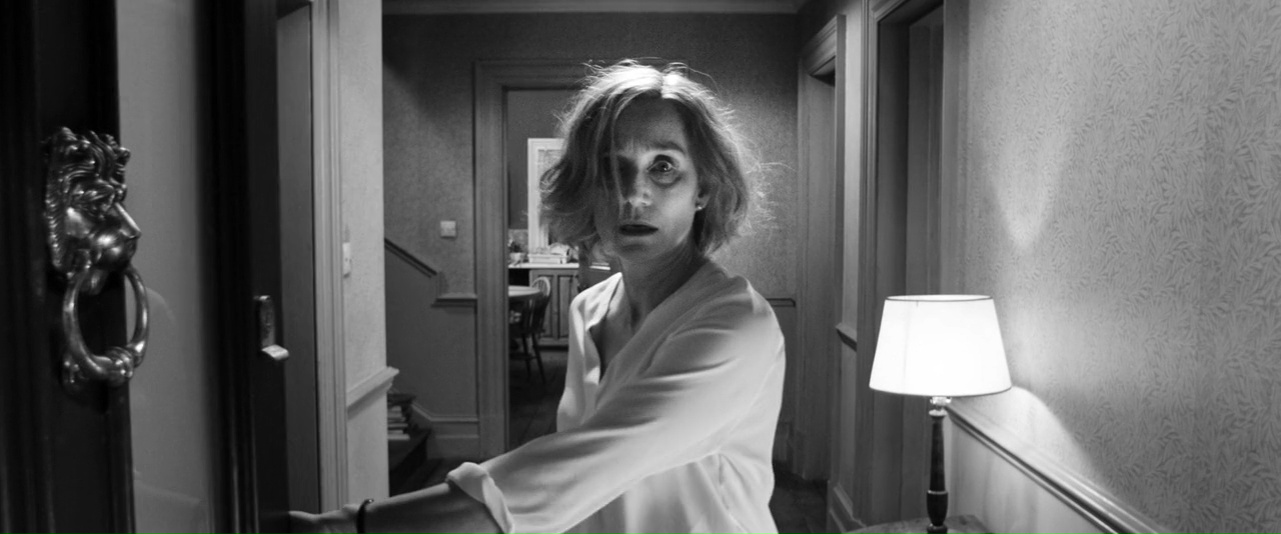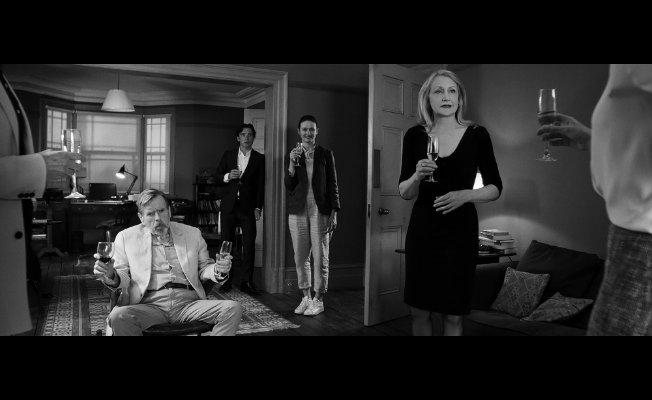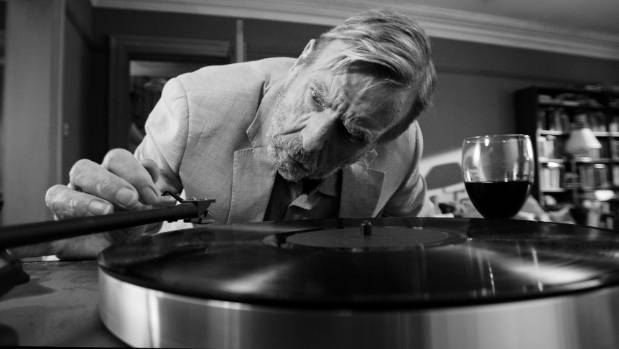Sally Potter's The Party

Sally Potter
remains one of Britain’s most determined independent
film-makers, deliberately resisting the lure of mainstream
attention in order to work entirely on her own terms.
Adapting Virginia Woolf’s 'unfilmable' novel
Orlando, directing herself in the
semi-autobiographical The Tango Lesson, and composing
the contemporary culture-clash romance Yes entirely
in iambic pentameter are certainly not choices made by a
director hungry for Summer blockbuster success.
Potter decided she wanted to make films after a relative lent her an 8mm camera when she was fourteen. "So I left school and struck out," she told Time Out. "I got jobs in restaurants, washing carrots, and joined the London Filmmaker's Co-op, making tiny, tiny films that just got bigger." Her first film was a short deconstruction of La Boheme called Thriller. Four years later came The Gold Diggers, a bizarre feminist musical with Julie Christie playing a trophy wife, carried aloft by men with gold strewn at her feet. It was comprehensively condemned by critics and for several years Potter concentrated on dance, performance art, and writing music for bands before enjoying a modest degree of art-house success with Orlando, which starred Tilda Swinton as a gender-switching hermaphrodite over a 400-year lifetime.
"I was part of a movement that wanted to take everything to do with filmmaking apart, including the narrative," Potter said at the time. "I'm now at the stage where I want to put it back together again. The story shows that it's hard to be a man and it's hard to be a woman, how society shapes and drives these things called masculinity and femininity. But what is infinitely more important is our common humanity." She has resolutely refused the 'feminist film-maker' label, even if she did start her career working with an all-female crew. "I've noticed that any female film director is called a feminist … just because she's female, which is just stupid. It's lazy," she told The Wip website. "I don't use the word because I try and be more specific. The word feminist has become so general it's like a shorthand that almost is without meaning. Which isn't to say that we don't have very different experiences and are treated very differently because of gender."
After the relative triumph of Orlando, Potter could have enjoyed her pick of Hollywood period scripts. Instead, she cast herself in The Tango Lesson as a film director who deals with the frustration of meeting cynical production executives by learning how to dance. Potter is a trained terpsichore who cast her own tango teacher and lit each scene with opulently theatrical chiaroscuro effects. It was a challenging exercise in aesthetic conviction that appealed to so few that Potter once again found herself relegated to the margins. After a swerve into historical romance with The Man Who Cried, she adopted Jean-Luc Godard's philosophy of what she calls "barefoot cinema" - films made on the fly with limited budgets and no need for compromise. Yes concerns an affair between a Lebanese refugee and an Irish-American scientist living in London and deals with the inevitable cultural tensions of such an unequal relationship. Rage is a murder mystery set in the New York fashion industry and narrated entirely by talking heads, including Judi Dench and Jude Law. Potter has never had any problem attracting talented actors, who usually earn no more than craft services, and her pitch was that anyone could watch the movie on their phone and download it for free.
Potter has also eschewed the golden rule in film production - never put your own money into a project. "I've always had an evolutionary approach to survival as a filmmaker," she told The Huffington Post. "Those who adapt survive, those who don't become dinosaur. So I figure that in this age of the terror of theft on the internet the cleverest thing to do is give it away." As an economic model, such a defiant approach has its disadvantages. Now 68, she still goes into debt to finance her films, confident they will earn enough for her to go on living. "Once you discover that you don't actually starve, every obstacle becomes an opportunity to redefine what you're doing, a vehicle for transformation" she said after making Rage. "That's perfect for taking the fear out of things. It's like Gertrude Stein said, 'Considering how dangerous everything is, nothing is really very frightening'."
The Party exemplifies Potter's guerilla approach to film-making. It is a slight, tight, and zesty black comedy, with a stellar cast that includes Kristen Scott Thomas, Cillian Murphy, Emily Mortimer, Cherry Jones, Timothy Spall, Bruno Ganz, and Patricia Clarkson scratching each other to shreds over the course of 71 gleeful minutes. The actors all received the same wages in order to promote pay equality for women in the film industry. The entire cast have also paid their dues on stage - and it shows in the professional precision and clipped delivery of their line readings. Her eighth feature was shot sequentially on a West London studio set in two weeks.
According to Potter, the movie was conceived “as an entertainment, in the Graham Greene sense of the word”. Arguably her most broadly entertaining film, she does not consider it the radical departure some critics have claimed. “I always thought Orlando was a comedy - in fact, I often think my films are comedies and then I’m surprised when people don’t laugh,” she said in a recent Guardian interview. “I’ll get better at it. When writing comedy, it’s technically difficult because you don’t know: is anyone going to laugh? We were laughing while we were making it, but that doesn’t mean other people are going to laugh.” Early test screenings were well received, however, so Potter decided to premiere it at the Berlin film festival. “There’s nothing like sitting in a cinema like the big hall in Berlin … with 3,000 people and then hearing the whole place vibrate with laughter. You know it’s doing everyone good, it’s a kind of medicine and it’s also incredibly validating." The Party was selected to compete for the Golden Bear in the main competition section of the 67th Berlin International Film Festival and ultimately won the Guild Film Prize at the Berlinale 2017.
The titular “party” of her bleak tragicomedy is an absurdly awful soiree during which a number of bourgeois couples unconditionally disintegrate. Scott Thomas plays Janet, the newly-appointed shadow health minister of an unnamed political opposition party through whose ranks she has rapidly ascended. We first meet her pointing a gun at the camera, a Chekovian harbinger of worse things yet to come in this short, sharp satire of love, politics, and burnt vol-au-vents. Janet is a steely, brittle, career idealist who believes in “truth and reconciliation,” rather than shouting and screaming. Yet during the course of a single calamitous evening both her marriage and career come screeching to a halt, while her right-thinking, left-leaning friends turn on each other in an increasingly farcical feeding frenzy.
The action is limited to an upmarket London townhouse, in which Janet is first seen preparing 'nibbles' and fielding congratulatory phone calls. She is considered to be an up-and-coming 'star' who “looks like a girl, thinks like a man … ministerial, in a 21st-century postmodern, post-post-feminist sort of way”. She also has a secret caller whose texts will add a bit of extra spice to the evening. Her academic husband Bill (played by a marvelously morose Spall) nurses a glass of red wine in the living room, the repeated blues refrain of I’m a Man blasting from his beloved stereo and accentuating his emasculation. “I’m Bill,” he declares forlornly, “or at least I used to be …” In fact, he’s now just another "Dennis or Philip," destined to trail haplessly behind his more powerful wife, a shadowy stranger in his own home.

The assorted guests
soon start to arrive - acid-tongued April (Clarkson) and her
life-coach boyfriend Gottfried (Ganz); pregnant Jinny
(Mortimer) and her older partner, Martha (Jones); and Tom
(Murphy), a "wanker banker" who snorts lines of coke in the
bathroom and assures everybody that Marianne, his mysterious
wife, will arrive later - somewhat like Godot. All come to
praise Janet, yet each bring their own personal baggage of
bitterness and bile. Martha is alarmed that she and Jinny
are about to become “a collective rather than couple.”
Gottfried is on his “last supper” with April, her
patience with his New Age psychobabble almost exhausted.
Bill shocks everyone by announcing he has been to see a
Harley Street specialist (“You went private?”),
one of several bombshells that are primed to explode during
the evening's festivities.
Potter’s first film since
2012’s Ginger & Rose (a sensitive portrayal of the
friendship between two earnest schoolgirls at the height of
the Cold War), The Party is a lean affair, shot in a
single location with few frills and less fuss - just an
A-list cast playing at the top of their game. Anton Chekhov,
Edward Albee, and Iris Murdoch are clear influences, as well
as such British cinema classics from the 1960s as Karel
Reisz’ Saturday Night and Sunday Morning and Bryan
Forbes' The L-Shaped Room. Aleksei Rodionov’s
crisply monochromatic cinematography has a similarly retro
feel and the grace with which his camera whirls around the
characters recalls the fluid poetry of Yes.
Choreography is a core element in all of Potter's films, and
it is evident again in the way she exuberantly waltzes her
cast through their various pirouettes and pratfalls - while
Bill’s collection of precious vinyl, seemingly randomly
selected to supply a kind of contrapuntal accompaniment to
the main action, supplies a subtly inappropriate soundtrack.

Potter told the
Observor that “I wanted to work with the healing
power of laughter as, let’s say, a shortcut through the
really tragic elements”. While Mike Leigh once joked that
he simply wanted to make people laugh, Potter has always
worked with a wry smile. The Party is a shaggy dog
story with a cannibalistic bite as the celebration of
Janet's promotion quickly descends into farce, mostly as a
result of the characters’ deceitful behaviour towards each
other. The slapstick tinge derives from a superfluity of
withering zingers, such as “Was that an announcement or a
cry for help?”, “You’re a first-class lesbian and a
second-rate thinker,” and “Tickle an aromatherapist and
you find a fascist.” But beneath the surface hilarity lies
an unexpected poignancy, such as when the rationalist Bill
is forced wrestle with metaphysical matters and Janet
rhetorically inquires “Why didn’t I notice?”
Ganz is perfectly cast as the esoteric, but kindly partner of Clarkson’s caricature of a mouthy American. Potter has admitted she has wanted to work with the Swiss actor ever since seeing Wim Wenders’ Wings of Desire: “I wanted to take the quality of profound compassion in that role … and tease it out and put it in this role, along with a brilliant comedic light touch. When I look at Bruno I want to laugh because there’s a little bit of irony there all the time.” Ganz (who played Hitler in Downfall) has said he particularly enjoyed developing his character because he was unused to playing comic roles: “I wanted to make Madame Merkel happy, so she can see a good German in a film, as we are all good now, and that was my goal." Spall, referring to Ganz’ attempts to resuscitate him, added that he was even luckier - “I get a kiss of life, full on the mouth from him."
Not far beneath The Party’s fragile surface, the characters’ petty personal crises reflect a wider despair over Britain’s current social and political malaise. Aside from Janet's personal meltdown, there is a conflict of principles between Gottfried’s apolitical humanist and the waspish nihilism of April, who believes "democracy is finished," while Tom’s Irish City Slicker counterbalances the discord between the lesbian couple who have differing standards of radical feminism. Murphy has described his character as a human hand grenade and Potter clearly relishes containing the controlled detonation within a restricted canvas for maximum impact. “Part of the project was to go back to cinematic bare bones,” she explained. “Strip away everything other than characters dealing with those difficult things in their lives, but do it lightly. And have that be a microcosm of wider, quite heavy, and difficult times politically.”
The specific situation shifted dramatically after Potter started writing the screenplay in the run-up to the 2015 general election. Shot during the same fortnight in which the Brexit referendum actually took place, The Party presents a middle-class nightmare as microcosmic charade, as the world rapidly goes to hell in a hand basket: “Half the crew and cast turned up weeping that morning as we found out the result. There was a feeling that the film … had a slightly prescient sense of what can go so very, very wrong when people lose touch with their principles.” Potter considers the result to be “absolutely a political statement,” as well as providing a “light and loving look at the state of a broken England.”
“Around that time, it felt like all politics had moved into a centre and lost its way, lost its feeling for telling the truth,” she commented. “So I felt that the struggle for people to tell the truth was very fertile territory. The gap between how people present themselves, to each other, to the world and to themselves even, and then what happens to them under extreme pressure, as delusions of self-image start scattering, falling, disintegrating. So that feels like it’s part of the way things are written about truth and post-truth. That wasn’t there when I wrote it. But it has become that.”
These larger ramifications hit home halfway through the film’s two-week shoot, when the Brexit referendum result left her and her international cast and crew completely stunned. “People turned up weeping,” she recalls. “On both sides of the camera, we had a lot of mixed European and other talent. A Russian director of photography. An Argentinian designer living in Paris. A French sound team. An Italian assistant, an Indian producer, lots and lots of different origins and a lot of people fearful suddenly or full of grief."
“It didn’t change anything in the script because the script was written and there it was. But what it did change was the subtext: it had an additional layer of meaning and people were aware of that. They had that feeling of, ‘Well, this is England. Right.’” The party to which Janet belongs is never specified, but she is a staunch NHS supporter and the political sympathies of The Party are far from ambiguous: “It also became about what it really means to be on the left, what it means to be effective, what it means to effect change, all of those things.” Like most of her peers, Potter is pessimistic about what a future outside the EU might hold for the UK’s film industry: “It’ll be damaging institutionally - financially as well, obviously. But it’ll be most damaging in the wider sense, for sort of encouraging a form of xenophobia, a polite sense of civil war.”
Comparisons to such cinematic classics as
Luis Buñuel's The Exterminating Angel, Mike Leigh's
Abigail's Party, or even Blake Edwards' hilarious
sixties farce The Party (starring Peter Sellers as a
bumbling Indian actor in Hollywood) are overdrawn. Potter's
film is basically a very brief and beautifully crafted piece
of intelligent theatre played out in real time. It is a
light and frothy amuse-bouche, the delicate flavours
of which depend largely on the developing dynamics between
its seven core characters, who deliver fizzing lines of
dialogue while simultaneously conveying the impression of
not really discussing anything much at all. Potter
substitutes Quentin Tarantino's spewing pop culture style of
delivery for one that sketches out some of the
socio-economic and political problems of contemporary
England - important issues that need to be discussed, but
are used here mainly as filler. Although it is
unquestionably amusing to observe these stereotypical
bourgeois lefties lacerate each other, the overall narrative
arc is somewhat shallow and many of its plot strands are
simply left dangling. Nonetheless, The Party is an
undeniably engaging and droll divertissement from an
independent filmmaker who has mastered her art without ever
compromising
it.



 Te Whatu Ora Health NZ: Health Warning – Unsafe Recreational Water Quality At South Bay And Peketā Beaches And Kahutara River Upstream Of SH1
Te Whatu Ora Health NZ: Health Warning – Unsafe Recreational Water Quality At South Bay And Peketā Beaches And Kahutara River Upstream Of SH1 Wikimedia Aotearoa NZ: Wikipedian At Large Sets Sights On Banks Peninsula
Wikimedia Aotearoa NZ: Wikipedian At Large Sets Sights On Banks Peninsula Water Safety New Zealand: Don’t Drink And Dive
Water Safety New Zealand: Don’t Drink And Dive NZ Olympic Committee: Lydia Ko Awarded Lonsdale Cup For 2024
NZ Olympic Committee: Lydia Ko Awarded Lonsdale Cup For 2024 BNZ Breakers: BNZ Breakers Beaten By Tasmania Jackjumpers On Christmas Night
BNZ Breakers: BNZ Breakers Beaten By Tasmania Jackjumpers On Christmas Night Te Whatu Ora Health NZ: Health Warning – Unsafe Recreational Water Quality At Roto Kohatu Reserve At Lake Rua
Te Whatu Ora Health NZ: Health Warning – Unsafe Recreational Water Quality At Roto Kohatu Reserve At Lake Rua